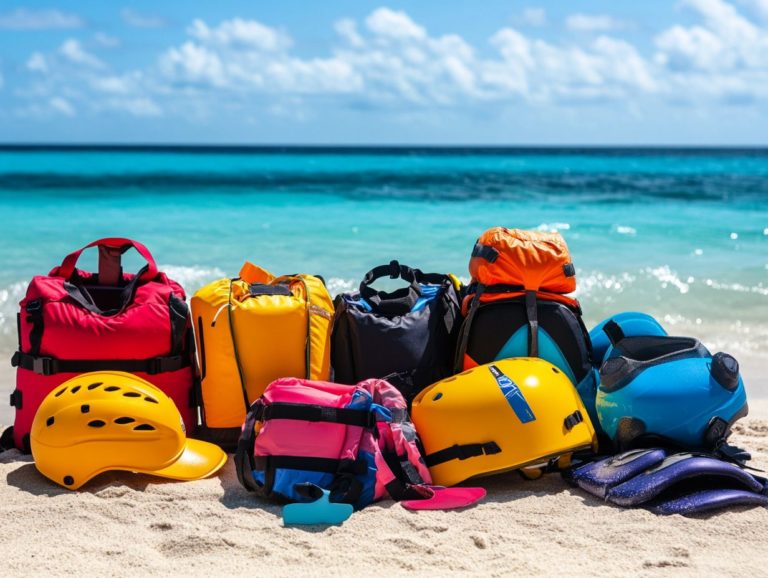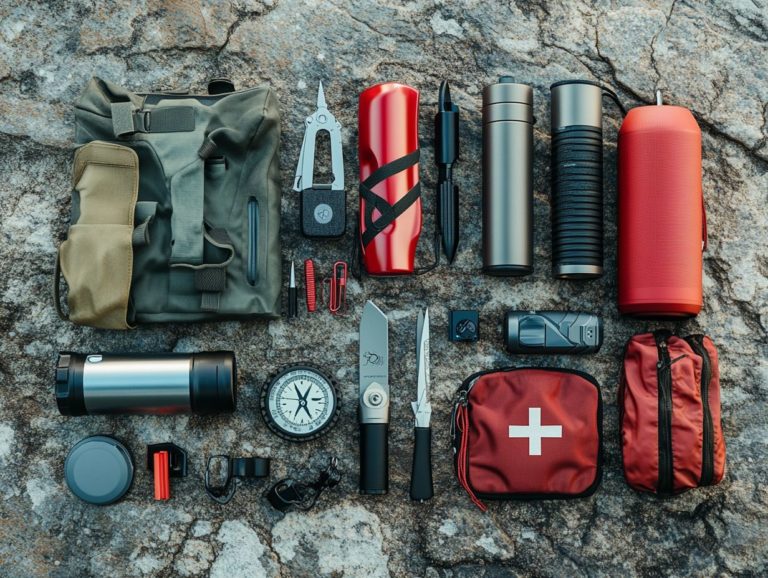What Makes Camping Equipment Eco-Friendly?
Experience the thrill of camping while protecting our planet! Eco-friendly gear allows you to enjoy the great outdoors without guilt. Camping is a cherished escape for you, a perfect opportunity to step away from the chaos of everyday life and reconnect with the beauty of nature.
However, traditional camping gear often carries a significant environmental cost. This discussion delves into the importance of eco-friendly camping equipment, helping you understand the ramifications of conventional gear while highlighting sustainable materials and design practices.
You ll find guidance on selecting the right eco-friendly gear and discover tips to enhance your camping adventures sustainably. Embrace the chance to make a positive impact while indulging in the great outdoors with eco-friendly practices!
Contents
- Key Takeaways:
- The Importance of Eco-Friendly Camping Equipment
- Materials and Design for Sustainable Camping
- Choosing the Right Eco-Friendly Gear
- Benefits of Using Eco-Friendly Camping Equipment
- Making Your Camping Trip More Sustainable
- Frequently Asked Questions
- What Makes Camping Equipment Eco-Friendly?
- How can camping equipment be made from sustainable materials?
- Why is using bamboo in camping equipment considered eco-friendly?
- What impact does using eco-friendly camping equipment have on the environment?
- Are there any specific certifications or labels to look for when purchasing eco-friendly camping equipment?
- Can I still find high-quality and functional camping equipment that is eco-friendly?
Key Takeaways:
- Choosing eco-friendly camping equipment is crucial for reducing environmental impact.
- Traditional gear often contains harmful materials and production methods.
- Eco-friendly camping gear is made from sustainable materials and uses environmentally friendly production methods.
- Consider factors like durability, recyclability, and renewable resources when purchasing.
- Using eco-friendly camping equipment has both environmental and personal benefits.
- Follow tips like reducing waste and using renewable energy to make your trip more sustainable.
The Importance of Eco-Friendly Camping Equipment
Eco-friendly camping equipment is critical for you as an outdoor enthusiast who aims to minimize your environmental impact while savoring the beauty of nature. With the rising awareness around sustainable camping, the demand for eco-friendly gear has skyrocketed. Brands are embracing ethical practices in their production methods, including those from companies like The North Face and Mountain Equipment.
Selecting the right camping gear elevates your outdoor experience and plays a crucial role in preserving natural habitats. Make eco-conscious choices to enjoy hiking trips and campsites without compromising the health of our planet. This understanding of eco-friendly camping equipment is essential for any responsible adventurer like yourself.
Understanding the Impact of Traditional Gear
Traditional camping gear often plays a significant role in environmental degradation. This is largely due to its reliance on non-biodegradable materials, which do not break down naturally and can pollute our environment for many years, and harmful production processes.
Consider, for example, products crafted from plastic or synthetic fibers think conventional tents and sleeping bags. These items can take centuries to decompose, contributing to pollution and waste accumulation in our precious natural habitats. As outdoor enthusiasts like yourself pursue adventure, the detrimental impact of heavy materials threatens ecosystems and diminishes the overall experience.
Fortunately, the industry is beginning to recognize the urgent need for lightweight, eco-friendly alternatives that minimize ecological footprints. Innovations such as biodegradable tents made from plant-based fabrics and backpacks crafted from recycled materials lead the charge toward more sustainable camping experiences while maintaining the functionality you expect. Brands like Klean Kanteen contribute significantly to this movement.
Materials and Design for Sustainable Camping
The materials and design of sustainable camping gear are essential in minimizing environmental impact. This allows outdoor enthusiasts like you to enjoy your adventures without guilt. By opting for products crafted from eco-friendly materials like biodegradable plastics and recycled fabrics you can significantly reduce your footprint on nature.
Brands such as Patagonia, The North Face, and Mountain Equipment have led the charge in this realm, particularly with certifications like the Green Shape label, which guarantees adherence to sustainable practices. By understanding these materials, you empower yourself to make informed choices when selecting your camping gear, contributing to a culture of sustainability within the outdoor community.
Eco-Friendly Materials and Production Methods

Eco-friendly materials and new ways of making products are revolutionizing the camping gear industry. They present sustainable alternatives that benefit both your adventures and the planet.
Brands like Klean Kanteen and LifeStraw lead the way in this movement. They use materials like stainless steel and BPA (a harmful chemical found in some plastics) free plastics that cut down on waste and enhance durability.
Klean Kanteen s dedication to creating compostable packaging underscores the importance of minimizing environmental impact. They ensure that every aspect of their product lifecycle is thoughtfully considered.
LifeStraw provides water filtration solutions made with eco-conscious materials. These products deliver clean drinking water without relying on single-use plastics.
Companies like Mountain Equipment are also stepping up, integrating sustainable production methods such as recycled fabrics and ethical sourcing into their operations.
This approach balances functionality with environmental responsibility, encouraging you to make more sustainable choices in your outdoor pursuits.
Choosing the Right Eco-Friendly Gear
Picking the right eco-friendly gear makes your adventures better and helps the planet! Think carefully about what gear you choose; it impacts both your fun and the environment!
As an outdoor enthusiast, prioritize durability, functionality, and the materials used in your gear selection. For example, choose reusable water bottles instead of single-use plastics. Ensure your camping gear is crafted from eco-conscious materials to significantly reduce waste.
With more brands embracing sustainable practices, knowing what to look for empowers you to make informed and responsible choices.
Factors to Consider When Purchasing
When you’re in the market for eco-friendly camping gear and outdoor products, consider these critical factors to ensure you’re making truly sustainable choices.
- First, think about the weight of the products. Lighter gear is often more practical for transport and can significantly reduce carbon emissions during your travels.
- Durability is another essential aspect. Higher-quality items that stand the test of time help minimize waste in the long run.
- Look for products that come with environmental certifications. These indicate a brand’s commitment to eco-friendly practices.
The sourcing of materials is integral to ethical manufacturing. Consider offerings from brands like Patagonia, REI, and Mountain Hardwear, which are renowned for their sustainable initiatives.
Lightweight options like the Big Agnes Copper Spur tent or Sea to Summit’s ultralight sleeping bags not only meet these eco-standards but also showcase how modern outdoor gear can seamlessly combine functionality with sustainability.
Benefits of Using Eco-Friendly Camping Equipment
Using eco-friendly camping equipment brings numerous benefits that go beyond environmental perks. It elevates your entire camping experience and fosters a sustainable lifestyle, making you feel more connected to nature.
For outdoor enthusiasts like yourself, choosing eco-conscious gear means actively reducing your carbon footprint and supporting the preservation of nature. Eco-friendly equipment not only helps create cleaner ecosystems but often features designs that enhance durability and functionality.
The personal advantages are just as important. Using sustainable camping gear instills a deeper sense of responsibility and connection to nature, making every hike and camping trip more rewarding.
Recognizing these benefits is crucial for anyone looking to harmonize outdoor enjoyment with environmental stewardship. Choose eco-friendly gear today and make a difference!
Environmental and Personal Advantages

The environmental and personal benefits of using eco-friendly camping gear are substantial and transformative.
By selecting products crafted from sustainable materials, you contribute to reducing waste that would clutter landfills. You also champion a culture of sustainability within your community. For example, opting for biodegradable soap or a reusable water bottle not only cuts down on plastic pollution but also elevates your camping experience. These choices allow you to forge a deeper connection with nature.
Using solar-powered lanterns and bamboo utensils showcases your commitment to social responsibility. This ensures that future generations can relish the great outdoors in its purest form. Ultimately, these decisions cultivate a profound appreciation for the environment while supporting healthier, more enjoyable outdoor adventures.
Making Your Camping Trip More Sustainable
Transforming your camping trip into a sustainable adventure is entirely within your grasp. With a few effective strategies, you can minimize waste and embrace eco-friendly practices that elevate your outdoor experience.
Be intentional about the products you pack and the waste you create. This approach significantly enhances your role as an environmental steward during your time in nature. Choose compostable options instead of disposables. Adhere to Leave No Trace principles, which encourage minimizing human impact on nature. Select gear and food that align with ethical practices.
Act now! Adopting this proactive mindset allows you to enjoy unforgettable outdoor moments while positively contributing to the health of our natural environments.
Tips for Reducing Waste and Impact
To effectively reduce waste and minimize your environmental impact during hiking trips and camping, employ these practical tips tailored for eco-conscious outdoor enthusiasts.
Select durable and reusable outdoor products to cut down on single-use waste. For example, choosing stainless steel water bottles or silicone food storage bags not only helps reduce plastic waste but also proves beneficial in the long run. Embrace composting for food scraps to enhance soil health while decreasing your contributions to landfills.
Another essential step is opting for eco-friendly cooking methods. Use portable solar ovens or open-fire techniques to further reduce reliance on traditional fuel sources. By cultivating a sustainability mindset, you create lasting positive impacts on nature while savoring every moment of your outdoor adventures.
Frequently Asked Questions
Here are some common questions about eco-friendly camping equipment that many campers have today.
What Makes Camping Equipment Eco-Friendly?

Camping equipment is eco-friendly if it minimally impacts the environment and is made from sustainable materials.
How can camping equipment be made from sustainable materials?
Camping equipment can use sustainable materials like bamboo, recycled plastic, and organic cotton. These materials are renewable, biodegradable, and have a lower carbon footprint.
Why is using bamboo in camping equipment considered eco-friendly?
Bamboo grows quickly and does not require harmful pesticides or fertilizers. It is also durable and has natural antimicrobial properties, making it an eco-friendly choice for camping gear.
What impact does using eco-friendly camping equipment have on the environment?
Using eco-friendly camping equipment reduces waste and pollution. It also helps preserve natural resources and ecosystems for future generations.
Are there any specific certifications or labels to look for when purchasing eco-friendly camping equipment?
Yes, look for certifications and labels like:
- Forest Stewardship Council (FSC) certification
- Green Shape label
- Global Organic Textile Standard (GOTS) certification
- Recycled Claim Standard (RCS) label
Can I still find high-quality and functional camping equipment that is eco-friendly?
Absolutely! Eco-friendly camping gear is in high demand, and many brands are stepping up to deliver outstanding products that are good for the environment.
Get ready to explore amazing options that meet your needs by researching and reading reviews!






